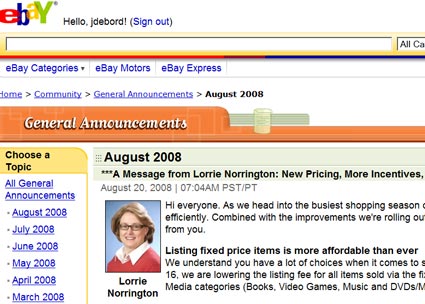As part of the continuing coverage of developments related to eBay’s “PayPal Only” business model objectives, eBay President Lorrie Norrington announced a number of policy updates. Some of these updates include the elimination of checks and money orders as a payment option (with the exception of “pick-up” transactions), which leaves users with very limited “electronic” options: credit cards, ProPay, and PayPal. Other developments include a new policy with regards to limiting the ability to sell on eBay if “DSRs” (Details Seller Ratings) do not meet certain thresholds. Given that eBay currently does not enforce other policies already in place, I will be interested to see if there is any actual enforcement and results following what I view to be a good policy (in theory).
eBay’s moves to a “PayPal”-only business model were first seen in the Australian market, as reported in these articles, and then began to be reflected in other developments:
- “PayPal Only” eBay Developments In The News
- More eBay Policy Developments Regarding PayPal
- Google “Check-Out” Proxy War With eBay’s “PayPal-only” Policy?
- U.S. PayPal Policy Update: More PayPal-eBay Integration
- Setback for “PayPal-only” eBay Policy in Australia
- eBay’s “PayPal Only” Debate Framed: Anti-Competition vs. Anti-Consumer Protection
- More eBay/PayPal Integration Via Dispute & Resolution Processes
Today’s full announcement can be read on eBay’s site:
Below is an excerpt of the section related to payment methods:
Faster, more reliable checkout on eBay
Starting this fall, we’re moving to an electronic checkout process that’s faster and more reliable for sellers and buyers. As part of this move, checks and money orders will no longer be accepted on eBay, although buyers can still use these payment methods for item pick-up, at the seller’s discretion. In addition, the electronic payment methods will be fully integrated into eBay checkout. For example, if a seller has an internet merchant account, a buyer will be able to directly enter a credit card and never have to leave the site.
Today, items paid with check or money order are 80% more likely to result in an item not received (INR) than those paid with credit card or PayPal. Also, buyers who pay with check or money order are 50% more likely to leave negative feedback than those who pay with electronic methods. So starting in late October, 2008, we are moving to 100% electronic payments – credit cards, ProPay, or PayPal.
This means that sellers will be able to offer credit card payments through their own merchant accounts, and payments through ProPay and/or PayPal, with all payment methods integrated into the checkout process on eBay. Seller will also get paid faster and be able to ship items quicker. And remember, for those buyers and sellers who use PayPal, we’re backing every eligible transaction with our buyer and seller protections. (See more information on paperless payments and more on terms for the PayPal Buyer and Seller Protection plans.)
I had never before heard of “ProPay”, but it appears to be a service used by sellers to accept credit card payments – not a service like PayPal, in which users have their own account with which to send and receive money. In other words, it is not a direct competitor to the PayPal business model or service – it merely provides a platform by which a seller can accept and process credit card payments. See the ProPay website to see “How ProPay Works“.
The other alternative is that eBay will allow sellers to process payments using their own credit card processing systems.
So for all practical purposes, this is probably as close to “PayPal-only” as is possible, and leaves individuals and even some small/pseudo businesses with little to no option other than to use PayPal (apart from the aforementioned “pick-up” scenario, which I imagine are few and far between, outside of merchandise like eBay Motors, etc.).
Below is an excerpt of the section related to seller standards:
Updated seller standards – minimum DSRs
Finally, we’re instituting a new minimum Detailed Seller Rating (DSR) requirement, as a way to further improve the customer experience for everyone on eBay. As of November 1, 2008, sellers will need at least a 4.3 across all four DSR categories, over the prior 30 day or 12 month period depending on volume, in order to list on the site.
Today, only a small fraction of sellers fall below this threshold, yet they are responsible for a high percentage of customer complaints, which hurts you and our marketplace overall. We’re urging all sellers whose scores fall below the 4.3 threshold to use the next two months to adjust their business models and/or work on improving their DSR scores.
As mentioned in the opening, this is a positive development, but it all comes down to enforcement. Policy is irrelevant if it is not consistently enforced (see “eBay Third Party Reporting Case Study Conclusion” and countless other articles).
Other changes that are part of the same announcement reflect eBay changing their emphasis from auctions to fixed pricing and “Buy It Now” sales, encouraged by lower sales fees on such transactions. In fact, it seems that this development is the focus of many of today’s mainstream media reports, over the move towards ubiquitous PayPal use for payment. This is interesting, given that PayPal is “an eBay Company”. Of news with that focus, I found an article at The Motley Fool most interesting in it’s take on the topic and analysis (see eBay Throws in the Towel), suggesting that eBay will soon look more like Amazon and Overstock.
I will continue to monitor eBay and PayPal policy developments. Past articles related to eBay and PayPal can be found HERE.
Jason De Bord


